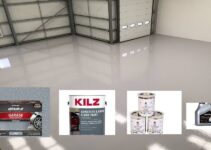Is Vinyl Flooring Good for Garage
Vinyl flooring has become a popular choice for homeowners looking for durable and versatile flooring options.
When it comes to the garage, a space that is often subjected to spills, dirt, and moisture, vinyl flooring can be a suitable and practical choice.
In this article, we will explore the benefits of using vinyl flooring in a garage, discuss its drawbacks, and provide some essential tips for selecting the right vinyl flooring for your garage.
What is vinyl flooring?
Vinyl flooring is a type of flooring made from polyvinyl chloride (PVC), a synthetic plastic. It is available in a variety of styles, including planks, tiles, and sheets. Vinyl flooring is known for being durable, water-resistant, and easy to clean.
Types of vinyl flooring
There are two main types of vinyl flooring:
- Vinyl composite tile (VCT): VCT is a type of vinyl flooring that is made from a mixture of PVC, ground limestone, and clay. It is a very durable type of vinyl flooring that is often used in commercial settings.
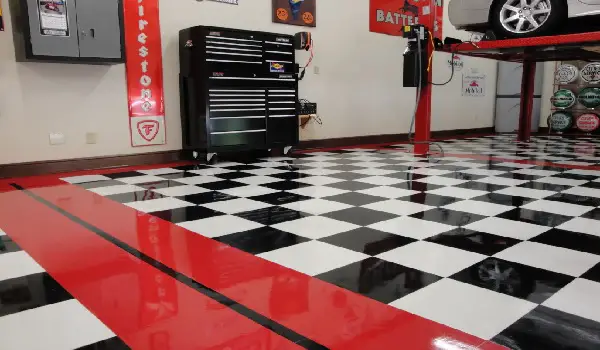
- Luxury vinyl tile (LVT): LVT is a type of vinyl flooring that is made from a thicker layer of PVC than VCT. It is available in a variety of styles, including planks, tiles, and sheets. LVT is a more expensive type of vinyl flooring than VCT, but it is also more durable and realistic-looking.
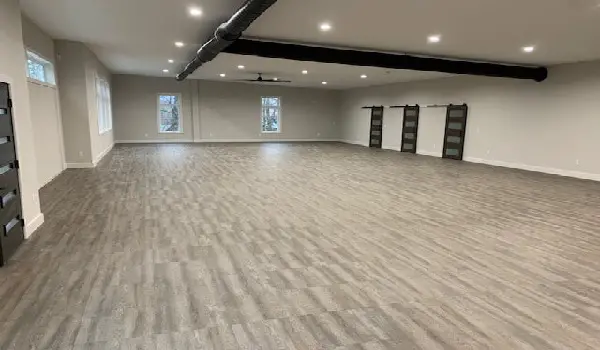
Here are some of the key differences between VCT and LVT:
| Feature | VCT | LVT |
|---|---|---|
| Material | PVC, ground limestone, and clay | PVC |
| Thickness | 1.2 to 1.5 mm | 2 to 3 mm |
| Durability | Very durable | More durable than VCT |
| Appearance | More industrial-looking | More realistic-looking |
| Price | More affordable | More expensive |
| Installation | Can be glued or loose-lay | Can be glued, loose-lay, or floating |
| Maintenance | Easy to clean and maintain | Easy to clean and maintain |
If you are looking for a durable and affordable flooring option, VCT is a good choice. If you are looking for a more realistic-looking and durable flooring option, LVT is a good choice.
Benefits of Vinyl Flooring for Garage
1. Durability
Vinyl flooring is known for its durability, making it a suitable choice for a garage. It can withstand heavy traffic, including the movement of vehicles and the impact of tools or equipment.
Vinyl flooring is resistant to scratches, dents, and fading, ensuring that it maintains its appearance over time.
2. Water Resistance
Garages are often exposed to moisture, whether from occasional spills, tracked-in rainwater, or melting snow from vehicles. Vinyl flooring is water-resistant, offering protection against such moisture.
This feature prevents water from seeping into the floor, reducing the risk of mold, mildew, and structural damage.
3. Easy to Clean
Keeping your garage clean is essential, and vinyl flooring simplifies the cleaning process.
With vinyl, all you need is a broom or vacuum to remove loose debris, followed by a mop with mild soap and water for deeper cleaning. The smooth surface of vinyl makes it easy to wipe away dirt, stains, and spills.
4. Low Maintenance
Vinyl flooring requires minimal maintenance compared to other flooring options. Unlike natural materials like hardwood or stone, vinyl does not need periodic sealing or waxing.
Its resistance to mold and mildew ensures that you won’t have to worry about extensive upkeep.
5. Affordability
If you’re looking for a cost-effective flooring solution for your garage, vinyl is a great option. It is relatively inexpensive compared to materials like hardwood or tile.
Vinyl provides a budget-friendly alternative without compromising on durability or functionality.
Disadvantages of Vinyl Flooring for Garage
While vinyl flooring offers several benefits, there are a few potential drawbacks to consider before making a decision.
Slip-Resistance
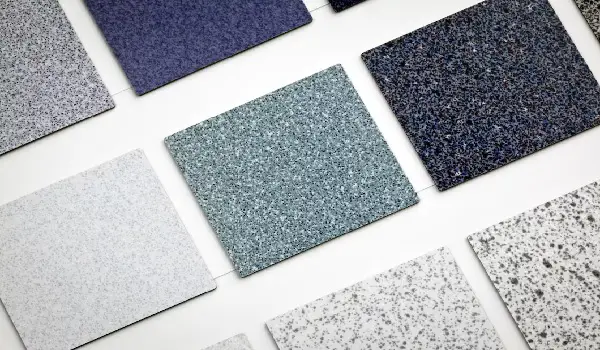
One of the downsides of vinyl flooring is that it can be slippery, especially when wet. It is important to exercise caution when walking on vinyl floors in your garage, particularly if there is moisture present.
Choosing a vinyl flooring product with a slip-resistant finish can help minimize the risk of accidents.
VOC Emissions
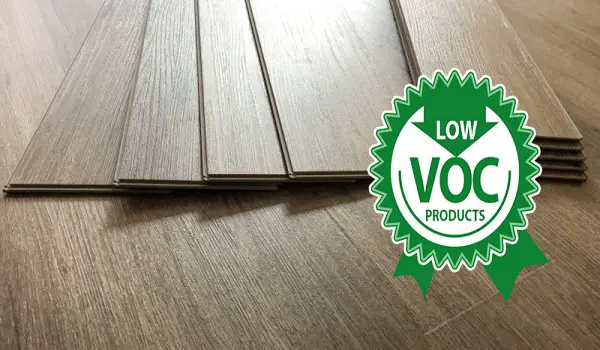
Certain vinyl flooring products may emit volatile organic compounds (VOCs), which can be harmful to your health.
When purchasing vinyl flooring for your garage, look for products that are labeled as low-VOC or VOC-free to ensure a healthier indoor environment.
Not as Durable as Other Options
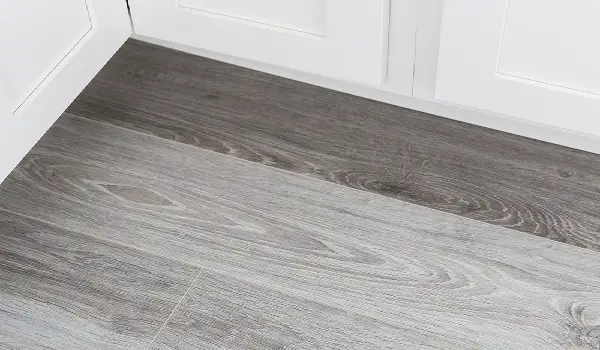
While vinyl flooring is durable, it may not be as resilient as some other flooring options like concrete or tile.
Heavy objects or sharp tools can potentially damage the surface of vinyl flooring.
It’s important to take necessary precautions to prevent any potential damage.
Tips for Choosing Vinyl Flooring for Garage
When selecting vinyl flooring for your garage, consider the following tips to make an informed decision:
- Choose vinyl flooring that is specifically designed for garage use. These products are typically more durable and better suited to withstand the demands of a garage environment.
- Opt for vinyl flooring with a slip-resistant finish to reduce the risk of accidents, particularly when the floor is wet.
- Prioritize vinyl flooring products that are low-VOC or VOC-free to ensure better indoor air quality.
- Proper installation is crucial for the durability and longevity of vinyl flooring. Follow the manufacturer’s guidelines or hire a professional installer to ensure a proper and secure installation.
How much does vinyl flooring cost?
The cost of vinyl flooring will vary depending on the type of vinyl flooring you choose, the size of your garage, and the installation method you choose. Vinyl flooring is generally a more affordable option than other types of flooring, such as hardwood or tile.
Here is a general breakdown of the costs involved in installing vinyl flooring in a garage:
- Materials: The cost of materials will vary depending on the type of vinyl flooring you choose. For example, VCT is typically less expensive than LVT.
- Labor: The cost of labor will also vary depending on the size of your garage and the installation method you choose. Glued installation is typically more expensive than floating installation.
In general, you can expect to pay between $1 and $3 per square foot for vinyl flooring materials. Labor costs will typically add an additional $1 to $2 per square foot. So, for a 1000-square-foot garage, you can expect to pay between $2,000 and $7,000 for vinyl flooring.
Conclusion
In conclusion, vinyl flooring is an excellent choice for a garage looking for a durable, versatile, and cost-effective flooring option.
Its durability, water resistance, easy maintenance, and wide range of design choices make it suitable for various spaces, including residential and commercial areas.
Vinyl flooring offers the advantage of being resistant to stains, scratches, and dents, making it ideal for high-traffic areas.
Its water resistance properties make it suitable for spaces prone to moisture, such as bathrooms and basements. Vinyl flooring is easy to clean and maintain, requiring minimal effort to keep it looking its best.
With advancements in technology, vinyl flooring now comes in a wide variety of designs, textures, and patterns, allowing homeowners to achieve the look of more expensive materials like hardwood or stone at a fraction of the cost. Whether you prefer a classic or contemporary style, vinyl flooring offers options to suit your aesthetic preferences.
When considering vinyl flooring for your home, it’s important to choose a reputable manufacturer and ensure proper installation. Professional installation can help ensure that the vinyl flooring is properly laid out and adhered to, providing a smooth and long-lasting result.
FAQs
Can I install vinyl flooring in my unheated garage?
Yes, you can install vinyl flooring in an unheated garage. Vinyl is known for its resilience in various temperature conditions, making it suitable for unheated spaces.
Can I park my car on vinyl flooring in the garage?
Vinyl flooring can withstand the weight and movement of vehicles. However, it’s advisable to use protective mats or pads under tires and other heavy objects to minimize the risk of indentation or damage.
Is vinyl plank flooring a good option for the garage?
Yes, vinyl plank flooring can be a good option for the garage. It provides a realistic wood-like appearance while offering the durability and water resistance of vinyl.
How long does vinyl flooring typically last in a garage?
The lifespan of vinyl flooring in a garage depends on various factors such as the quality of the product, installation, maintenance, and usage. On average, well-maintained vinyl flooring can last anywhere from 10 to 20 years.
